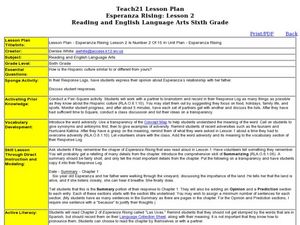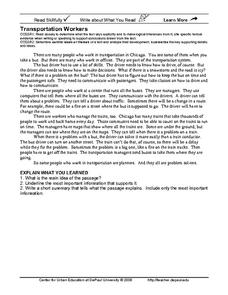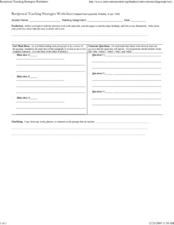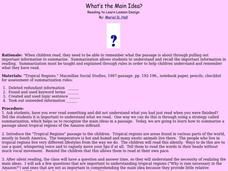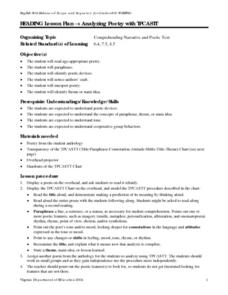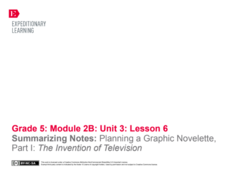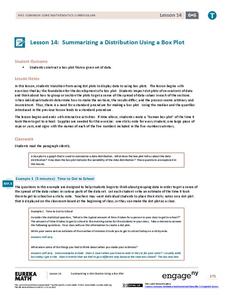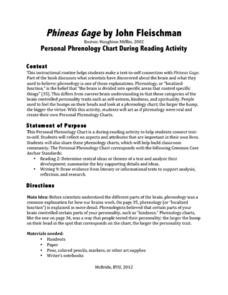Curated OER
Esperanza Rising: Lesson 2
Sixth graders explore adversity. In this summarizing lesson students compare their culture to the Hispanic culture. Students reflect on a time they were met with adversity. Students summarize Chapter 1 of Esperanza Rising.
Curated OER
Transportation Workers
Summarizing a text means being able to identify supporting details. Your class can learn about transportation workers in Chicago as they read a one-page informational passage. When they are finished reading they'll explain what they've...
Curated OER
The Outsiders: Anticipation Guide
The Outsiders by S.E. Hinton is always a favorite for middle and high school readers because it addresses issues that hit home to them, decades after the book is set. Have learners fill out an anticipation guide that encourages them to...
Curated OER
Reciprocal Teaching Strategies Worksheet
For this pre-reading activity worksheet, students respond to 3 questions that require them to list main ideas, generate questions, and clarify unclear items prior to reading a selection.
ReadWriteThink
Decoding the Dystopian Characteristics of Macintosh’s “1984” Commercial
Known as one of the most iconic advertisements of the 20th century, Macintosh's "1984" commercial has become more of a social statement. Present the ad to a new audience of viewers with a instructional activity focused on...
Curated OER
What's the Main Idea?
Students summarize a piece of text. After reviewing the correct way to read and summarize, students work in groups to summarize a piece of text assigned by the instructor. They write a summary paragraph using the process outlined during...
Curated OER
Mapping Out the Story
Discuss the reading comprehension strategy of summarization with your elementary schoolers! They read a chapter from their social studies textbook, Regions Near and Far, and create a map, or word web, for the chapter. They identify...
Curated OER
What's the Big Deal?
Learners listen to a passage (suggested reading: "Do a Cat's Eyes Glow?") and create a map of what they hear. They use the map to write a summary. Then, they read their own passages and independently map and summarize it the same way....
Curated OER
Modernism in Poetry, Painting, and Music
Are you teaching Modernism to your class? Connect different areas of artistic expression in the Modernist Era. Learners read T.S. Eliot, view art by Pablo Picasso, and listen to a Modernist musical composition. This final assignment is...
Curated OER
"Sunday in the Park" Reader's Response
After reading Bel Kaufman's "Sunday in the Park," give your class the opportunity to react to the short story through writing. First they write a brief summary paragraph, and then they react to any events or characters' actions in a...
Curated OER
Analyzing Poetry with TPCASTT
Middle schoolers read a poem and complete a TPCASTT chart. They make a prediction about the title (T) , paraphrase each line (P), identify poetic devices and nuances (C-connotation), explore mood and tone (A-attitude), point out shifts...
Maine Content Literacy Project
Introduction to Literacy Criticism
As learners continue to examine a short story of their choice, they take some time to look at analysis completed by others on the same story. In the eleventh lesson in a series of fourteen, pupils explore various sites for literary...
Curated OER
How Do I Write an Article Critique?
Your middle and high schoolers have written tons of summaries, but can they give a strong critique of an article they've read? Identify the differences between summary writing and critiquing. Choose an interesting article and have...
Tech Coach Corner
Understanding Sentences
Go over how to read complex sentences. Learners work on identifying key ideas, examining sentence structure, looking up new vocabulary, and paraphrasing. An overview of methods to help class members read difficult texts, half of the...
Curated OER
Retelling the Tiny Seed
Here is a very age appropriate idea that can be stretched, modified, or used as is. Learners review plant parts, discuss pollination, read the story The Tiny Seed, and write a retell sentence. Their sentences describe to way a seed...
EngageNY
Summarizing Notes: Planning a Graphic Novelette Part 1: The Invention of Television
What's the story? Learners create the first of four storyboards about the invention of the television, incorporating narrative techniques and descriptive details. Next, they offer and receive feedback by participating in a peer critique...
EngageNY
Summarizing a Distribution Using a Box Plot
Place the data in a box. Pupils experiment with placing dividers within a data set and discover a need for a systematic method to group the data. The 14th lesson in a series of 22 outlines the procedure for making a box plot based...
Soft Schools
Practice Reading Poetry
Identify the rhyme scheme in a activity that features "Mary Had a Little Lamb." Readers use the nursery rhyme to reinforce poetic elements in four comprehension questions.
EngageNY
Summarizing Bivariate Categorical Data in a Two-Way Table
Be sure to look both ways when making a two-way table. In the lesson, scholars learn to create two-way tables to display bivariate data. They calculate relative frequencies to answer questions of interest in the 14th part of the series.
Curated OER
Phineas Gage: Personal Phrenology Chart During Reading Activity
Phrenology, the belief that parts of your brain control certain aspects of your personality, is described in Phineas Gage: A Gruesome but True Story About Brain Science. While we now know much more about the brain, learners use this...
For the Teachers
Story Strips Sequencing
What happens next? Work on story sequence with a instructional activity that prompts kids to put a story back in order. Additionally, they discuss what would happen if one event was missing from the sequence.
Fluence Learning
Writing Informational Text: Lemonade Stand
Use a performance task to assess third graders' ability to read informational text. After they plan a lemonade stand business, young entrepreneurs implement that plan through informational writing. The task assumes learners can...
Curated OER
Why Do Governments Exist? Locke, Hobbes, Montesquieu, and Rousseau
Here is a great secondary source reading that includes the primary ideas and philosophies of the famed Enlightenment philosophers: Thomas Hobbes, John Locke, Charles Montesquieu, and Jean-Jacques Rousseau. In additional to discussing...
Judicial Learning Center
The Ratification Debate
Most Americans profess their love for the US Constitution, but this was not always the case. An informative lesson overviews the debate between the Federalists and Anti-Federalists by summarizing the main arguments of each side. It...
Other popular searches
- Summarizing Reading Passages
- Summarizing Reading
- Reading Summarizing Games
- Guided Reading Summarizing
- Summarizing in Reading
- Summarizing Reading Strategy
- Reading Summarizing Worksheet
